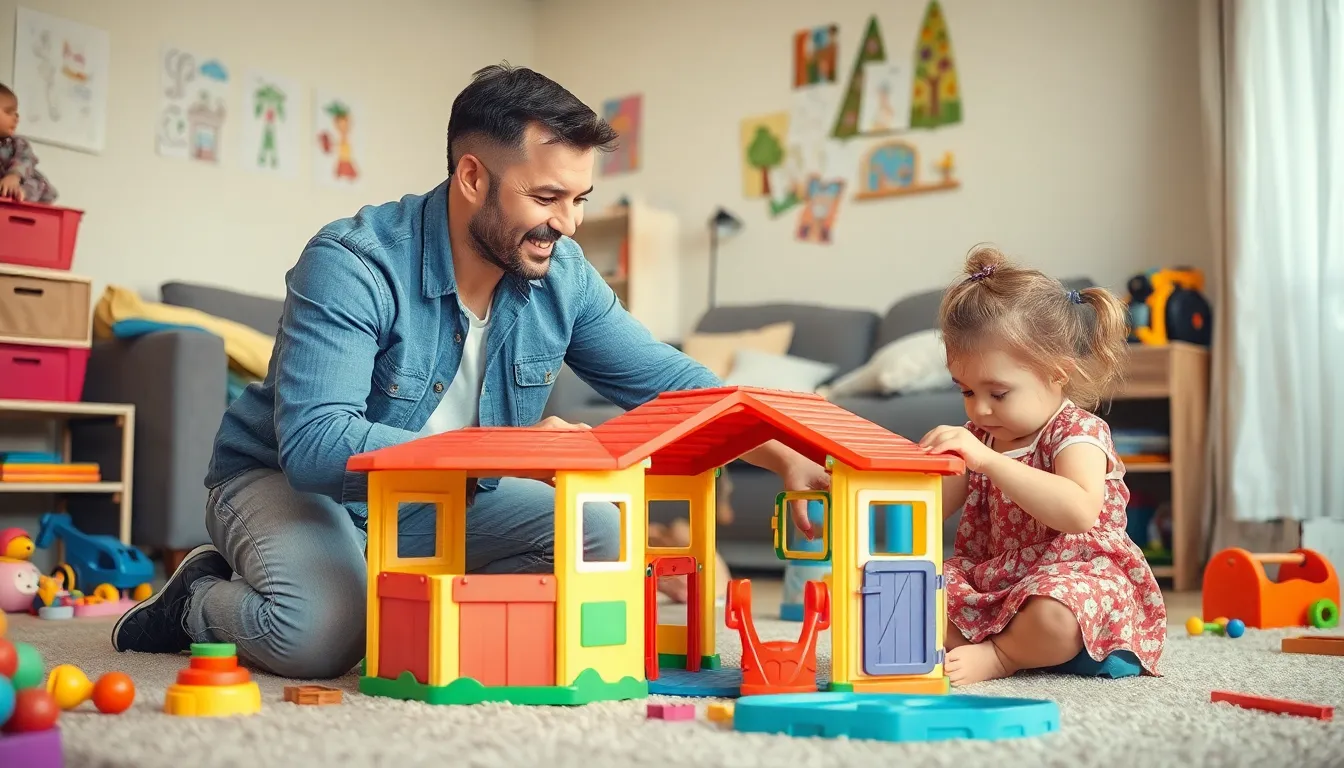Talking about emotions might feel like trying to juggle flaming torches while riding a unicycle. It’s tricky and can get messy, but it’s crucial for a balanced life. Emotions are like the weather—they can be sunny one moment and stormy the next. Ignoring them is like pretending it’s not raining while you’re soaked to the bone.
Table of Contents
ToggleImportance Of Talking About Emotions
Talking about emotions offers crucial benefits for individuals and their surrounding environments. Engaging in open discussions helps in understanding oneself and others more effectively.
Emotional Intelligence
Emotional intelligence refers to the ability to recognize, understand, and manage emotions. Increased emotional intelligence enhances decision-making and fosters thoughtful responses. Individuals with high emotional intelligence often navigate social complexities with ease. Research shows that 90% of top performers possess strong emotional intelligence skills. Developing this skill leads to better self-awareness, allowing for more effective coping strategies and healthier emotional expression.
Strengthening Relationships
Strengthening relationships hinges on open communication about feelings. Partners and friends who express emotions create a deeper bond based on trust. Sharing emotions reduces misunderstandings and builds empathy, making it easier to resolve conflicts. Those who engage in emotionally honest conversations report higher satisfaction in their relationships. Data suggests that 62% of individuals who communicate their emotions experience more fulfilling interpersonal connections. Prioritizing discussions about feelings fosters a supportive environment for all involved.
Barriers To Talking About Emotions
Barriers often prevent individuals from discussing emotions openly, impacting personal growth and relationships.
Societal Norms
Societal norms discourage emotional expression, defining vulnerability as a weakness. Such stigmas lead many to internalize feelings rather than share them. Communication often shifts towards superficial engagement, neglecting deeper emotional connections. Individuals may prioritize maintaining a tough exterior over embracing vulnerability. In fact, data reveals that up to 70% of people feel societal pressure to downplay their emotions. Fewer people open up about emotional experiences due to these pervasive expectations. Ultimately, these norms hinder the development of emotional intelligence and fulfilling relationships.
Personal Fears
Personal fears significantly impede emotional expression. Anxiety about judgment arises when individuals consider sharing feelings. Concerns about being misunderstood or rejected often prevent open conversations. Many express worry about burdening others with their emotions. A startling 80% of individuals hesitate to discuss feelings due to such fears. These trepidations lead to isolation, causing emotional distress to persist unaddressed. Recognizing these fears can encourage individuals to confront and share their emotions, fostering healthier interactions.
Approaches To Talking About Emotions
Talking about emotions can take various forms, enhancing understanding and connection. Effective methods exist to improve communication around feelings.
Active Listening Techniques
Active listening plays a vital role in emotional conversations. Paraphrasing shows understanding, helping speakers feel heard. Asking open-ended questions encourages deeper discussions, allowing individuals to express more. Maintaining eye contact fosters a supportive atmosphere, creating a connection between participants. It is essential to avoid interrupting, which can dissuade individuals from sharing their thoughts. Establishing a non-judgmental tone also promotes open exchanges, leading to healthier emotional dialogues.
Using “I” Statements
Using “I” statements transforms emotional discussions. This approach fosters ownership of feelings, as in “I feel upset when…” These statements prevent defensiveness, clarifying emotions without placing blame. People express thoughts without making others feel attacked. For instance, “I need support” replaces “You don’t help me,” which can trigger conflict. Incorporating “I” statements enhances clarity, leading to better understanding. This technique strengthens relationships by promoting empathy and reducing misunderstandings.
The Role Of Therapy In Talking About Emotions
Therapy plays a crucial role in facilitating discussions about emotions. It provides a safe environment for individuals to explore their feelings without fear of judgment. Therapists often employ techniques that enhance emotional expression, enabling clients to articulate their emotions clearly.
Cognitive Behavioral Therapy (CBT) frequently assists individuals in identifying and reframing negative thought patterns. This structured approach helps clients recognize how their emotions impact decisions and relationships, fostering healthier communication practices. Research reveals that individuals engaging in therapy experience significant improvements in emotional intelligence.
Group therapy also enhances emotional conversations. Participants can share their experiences and hear diverse perspectives. This communal setting encourages empathy and reduces feelings of isolation, as 62% of individuals who discuss emotions report deeper connections.
Moreover, therapists often teach active listening skills. Such skills promote understanding, allowing individuals to engage in meaningful dialogues. Techniques like paraphrasing and maintaining eye contact create a supportive atmosphere that encourages openness.
Expressing emotions through “I” statements proves beneficial. This method helps individuals communicate feelings without attributing blame. It encourages vulnerability and enhances relationship dynamics, addressing the needs of those who fear judgment when discussing emotions.
Therapy confronts societal norms that discourage emotional expression. Individuals learn to challenge the belief that vulnerability equals weakness. By addressing these barriers, therapy paves the way for healthier interactions and personal growth.
Practicing emotional discussions within therapy translates to everyday situations. Engaging with emotions in a therapeutic context equips individuals with the tools to navigate complex conversations outside of sessions. Prioritizing emotional dialogue fosters a supportive culture, whether in personal relationships or community settings.
Conclusion
Embracing emotional conversations is vital for personal growth and healthier relationships. By recognizing and addressing emotions openly individuals can break down barriers that often hinder genuine connections. This practice not only fosters emotional intelligence but also cultivates a supportive environment where trust and empathy thrive.
As people become more comfortable discussing their feelings they’ll likely find that vulnerability is a strength rather than a weakness. Utilizing techniques like active listening and “I” statements can significantly enhance these discussions leading to deeper understanding and connection. Ultimately prioritizing emotional expression enriches lives and strengthens bonds within communities.







